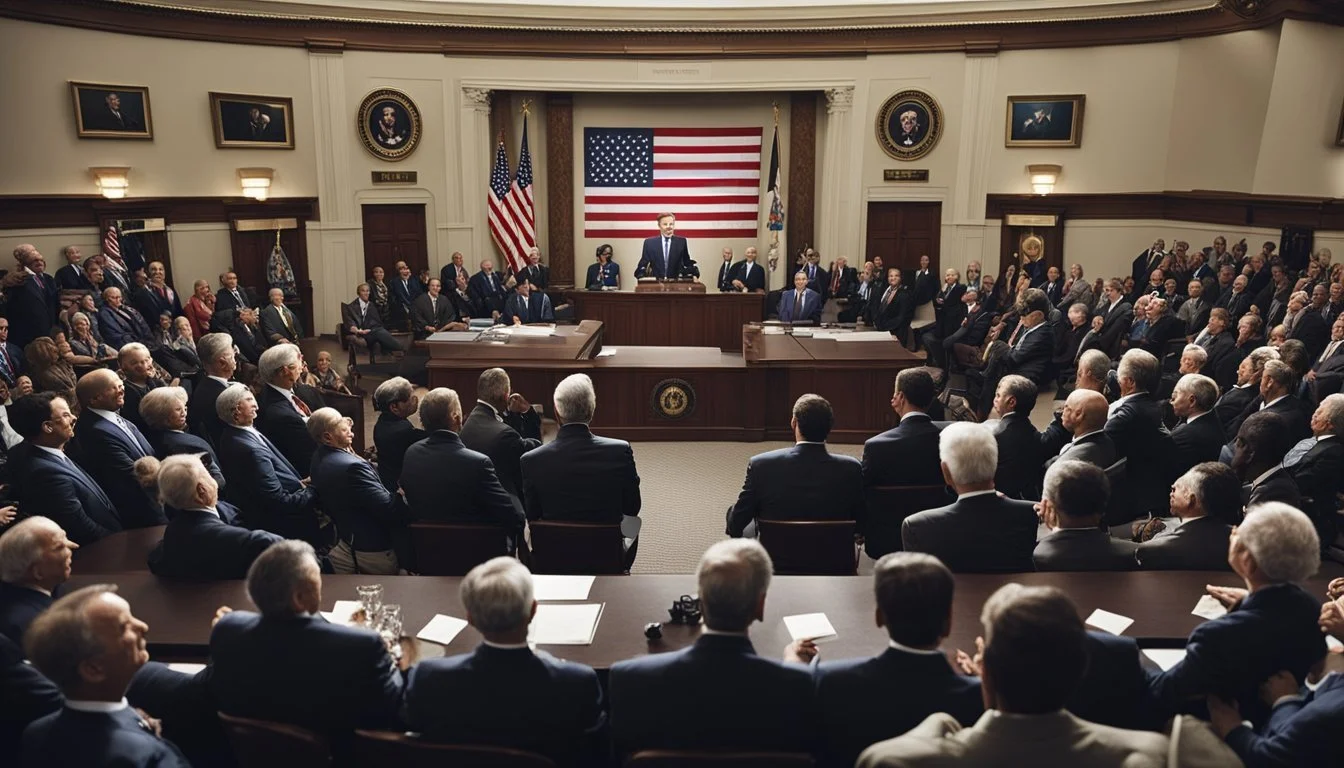9 Films Examining the Presidency of George H. W. Bush
A Historical Insight
The presidency of George H. W. Bush, the 41st President of the United States, has been a subject of extensive examination and portrayal in various films. These films delve into different aspects of his time in office, offering insights into his policies, leadership style, and impact on both the national and global stage.
These cinematic works provide viewers with a deeper appreciation of the complexities and nuances of Bush's presidency, from his foreign policy decisions during pivotal moments like the Persian Gulf War to his domestic challenges. Through the lens of documentary filmmakers and dramatists, Bush's tenure is brought to life, allowing audiences to reflect on his contributions and the historical context of his leadership.
1) W. (2008)
"W." is a biographical drama directed by Oliver Stone, focusing on the life of George W. Bush.
The film explores Bush's early years, his struggles with alcohol, and his journey to the White House.
Portraying key events and decisions during his presidency, "W." provides insights into his relationships with family members and political figures.
For more information, visit IMDB.
2) Nixon
President George H. W. Bush's connections with various figures are significant when looking at his presidency. Richard Nixon, the 37th President of the United States, played a crucial role in shaping Bush's political career.
After Bush lost a Senate race, Nixon, recognizing his potential, offered him opportunities in Washington. This move was pivotal in Bush's rise in national politics.
Several films have examined the intricate relationship between Nixon and other political figures, showcasing his impact on American politics. These films provide insights into Nixon's administration and his interactions with future leaders.
All the President's Men (1976): This film explores the Watergate scandal, highlighting the investigative journalism that led to Nixon's resignation. More Information
Nixon (1995): Directed by Oliver Stone, this biographical film delves into Richard Nixon’s life, providing a comprehensive look at his political journey. More Information
Frost/Nixon (2008): This film portrays the televised interviews between David Frost and Richard Nixon, focusing on the aftermath of the Watergate scandal. More Information
These films highlight Nixon’s significant influence and the political landscape that shaped George H. W. Bush's early career. They offer essential context for understanding the dynamics between these two notable figures.
3) The Dark Side of the White House
"The Dark Side" (2006) is a revealing documentary that examines the controversial decision-making and actions within the White House during the George H. W. Bush administration.
Produced by PBS's Frontline, it delves into critical issues of national security and the use of power within the presidency.
The film provides an inside look at the secretive aspects of policy-making and the intricate web of political maneuvering that defined Bush’s time in office.
The documentary pays particular attention to the administration's handling of the Gulf War and its implications for future U.S. foreign policy.
It highlights the influence of key figures like Dick Cheney and Donald Rumsfeld, who played pivotal roles during this era.
Through interviews and archival footage, "The Dark Side" sheds light on the complexities and challenges faced by the Bush administration, offering a critical perspective on the balance between security and civil liberties.
The film serves as an important historical record, reflecting on how decisions made during this period continue to impact current political landscapes.
For more details, check out "The Dark Side" on IMDb.
4) 41 (2012)
"41" is a documentary film that offers an intimate look into the life of George H. W. Bush, the 41st President of the United States. Directed by Jeffrey Roth, the film presents Bush's story in his own words, providing an unprecedented level of personal reflection.
The documentary covers significant events and periods in Bush’s life, from his early years in public service to his presidency. Viewers get a glimpse of both his political career and personal experiences.
The film highlights interviews with Bush conducted at his summer home in Kennebunkport, Maine. This setting adds a personal touch, making the documentary feel engaging and authentic.
"41" is notable for its access to Bush and its detailed portrayal of his character and legacy, capturing his perspective on his presidency and life achievements.
For more information: IMDb - 41 (2012)
5) George Bush: The Making of a Presidential President
"George Bush: The Making of a Presidential President" (2018) explores the journey of George H. W. Bush from his early life to the Oval Office.
The documentary highlights key moments illustrating Bush's long and diverse career. It covers his military service during World War II, where he served as a Navy pilot.
Bush's political ascent is also detailed. From his role as a U.S. Congressman to his time as the Director of the CIA, Bush's experiences shaped his leadership style.
The film delves into his tenure as Vice President under Ronald Reagan. His partnership with Reagan played a critical role in the administration's policies and set the stage for his presidential run.
Upon becoming President, Bush faced significant global challenges, including the end of the Cold War. His diplomatic skills were pivotal during this period.
The documentary also touches on his domestic policies and the challenges he faced on the home front. IMDb.
6) The Longest Ride (2015)
"The Longest Ride," directed by George Tillman Jr., may not seem directly related to the presidency of George H.W. Bush at first glance.
The film intertwines the love story of a young couple with the flashbacks of a World War II veteran named Ira, played by Alan Alda. While not a political film, it touches on values like service and resilience.
These themes relate to Bush's World War II service as a Navy pilot. The flashbacks in the movie highlight sacrifices made during the war, much like Bush's own service and the impact it had on his life and presidency.
The movie’s portrayal of enduring values and the personal histories it unfolds provides a subtle reflection on Bush's legacy.
7) CIA: A Secret History
The film "CIA: A Secret History" (2011) explores the clandestine world of the Central Intelligence Agency under the leadership of George H.W. Bush. His tenure as the 11th Director of Central Intelligence marked a pivotal moment for the agency.
Sworn in on January 30, 1976, Bush took charge of the CIA during a time of immense scrutiny and controversy. This documentary delves into how he restored focus and morale within the agency. His efforts were aimed at connecting with the workforce and rebuilding public trust.
Bush's charismatic and outgoing demeanor played a significant role in his leadership. Agency personnel reportedly found his approach refreshing, and he quickly became well-regarded among his colleagues. His term laid the foundation for significant transformations within the CIA.
The film provides a detailed look at the challenges and achievements of Bush’s time as the DCI. It highlights how his leadership helped the agency navigate a critical period in its history, ultimately setting the stage for future operations.
Watch "CIA: A Secret History" to learn more about how George H.W. Bush shaped the CIA during his tenure.
8) In The Shadow of the Oval Office
In the Shadow of the Oval Office (2009) provides a detailed examination of George H. W. Bush’s presidency through the lens of his national security advisers. This documentary emphasizes the role of Brent Scowcroft, the only adviser to serve under both President Gerald Ford and George H. W. Bush, and highlights his expertise in navigating international crises.
Scowcroft’s strategic approach is a focal point in the film. The documentary shows his ability to gain trust, foster collaboration, and maintain a close relationship with the president. His influence is evident in major events like the end of the Cold War and the Gulf War, making this film an insightful look at the inner workings of Bush’s administration.
By focusing on the interactions between the president and his advisors, the film provides a unique perspective on decision-making at the highest level. With interviews, archival footage, and expert analysis, it paints a vivid picture of the complexities of national security during Bush’s tenure.
Learn more about In the Shadow of the Oval Office (2009) on IMDb.
9) War and Politics
The impact of George H. W. Bush's presidency on global conflict and political strategies is explored in several films. Here are some key titles.
1. The Gulf War (1996)
This documentary delves into the 1991 conflict between Iraq and the coalition forces led by the United States. It highlights the military strategies and political decisions that defined America's response to Saddam Hussein's invasion of Kuwait. More on IMDb.
2. Frontline: The Gulf War (1996)
A thorough examination of the events leading up to and during the Gulf War, this PBS documentary provides insight into Bush's decision-making process and how it reshaped U.S. foreign policy. More on IMDb.
3. The Long Road Home (2017)
Although primarily focused on the Iraq War of 2003, this series references the 1991 Gulf War and Bush's strategies, illustrating the long-term effects of his presidency on subsequent conflicts in the region. More on IMDb.
4. CNN Special Report: The War in the Gulf (1991)
This report provides real-time coverage and analysis of the Gulf War, offering viewers a look at the media's role in shaping public perception during Bush’s administration. More on IMDb.
5. The Unknown Known (2013)
A documentary by Errol Morris, it features interviews with Donald Rumsfeld, offering reflections on the decisions made during Bush's presidency, especially regarding the Gulf War. More on IMDb.
Historical Context of George H. W. Bush's Presidency
George H. W. Bush's presidency was marked by significant global and domestic events. These included the end of the Cold War, the Gulf War, and notable economic policies.
Cold War Dynamics
George H. W. Bush took office as the Cold War was winding down. The fall of the Berlin Wall in 1989 symbolized the collapse of communist regimes in Eastern Europe. Bush played a key diplomatic role, establishing a working relationship with Soviet leader Mikhail Gorbachev. The two leaders signed significant arms reduction treaties, including START I, which aimed to reduce the nuclear arsenals of both nations. Bush's cautious and pragmatic approach helped maintain stability during this transitional period.
The Gulf War
The Gulf War was a defining event of Bush's presidency. In August 1990, Iraq invaded Kuwait, prompting a strong response from Bush. He formed a broad international coalition and received authorization from the United Nations to use force. Operation Desert Storm commenced in January 1991, quickly achieving its objective of liberating Kuwait. Bush's decisive leadership and the coalition's success in the Gulf War bolstered U.S. global standing. The war demonstrated the effective application of military power and coalition diplomacy.
Economic Policies
On the domestic front, Bush faced significant economic challenges. Early in his term, the country experienced a recession. Bush's response included a mix of spending cuts and tax increases, which was controversial within his own party. The signing of the 1990 budget agreement, which included tax hikes despite his "no new taxes" pledge, drew significant political backlash. Additionally, the North American Free Trade Agreement (NAFTA) negotiations began under his administration, setting the stage for its later implementation. Bush's economic policies were aimed at long-term fiscal stability but faced mixed reactions and outcomes.
Portrayal of George H. W. Bush in Cinema
George H. W. Bush has been a subject of various cinematic interpretations, reflecting his complex character and the significant events during his presidency.
Character Analysis
Films examining George H. W. Bush's presidency often focus on his political acumen and personal qualities. He is portrayed as a strategic yet cautious leader, navigating the complexities of the Gulf War and managing domestic issues. His diplomacy skills and efforts to build international coalitions are frequently highlighted.
His personal traits, including his reserved demeanor and strong sense of duty, juxtapose his moments of vulnerability. These films strive to present a balanced view, showing his strengths and challenges, aimed at providing a multifaceted portrayal of the 41st President.
Director's Vision
The directors of these films take different approaches to capture Bush's essence. For example, Oliver Stone's biographical drama, featuring Josh Brolin as George W. Bush, includes poignant reflections of Bush Sr., exploring the familial and political dynamics that influenced his presidency.
Directors emphasize significant moments such as the Gulf War victory and subsequent political decline. Through varied storytelling techniques, they aim to give audiences a deeper understanding of Bush's decisions and legacy, delving into both public triumphs and personal struggles. These visions collectively enrich the portrayal of George H. W. Bush in cinema.






